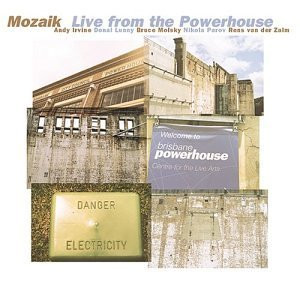 In the late 1960s an aspiring young Irish folk musician named Andy Irvine traveled through the Balkans. He jammed with local folk musicians everywhere he went and absorbed the different traditions of the region. Irvine then brought these Balkan influences with him into Planxty, who became one of the most important and influential bands that Irish traditional music has ever produced. While the music of his subsequent solo career has remained firmly rooted in Irish tradition, Irvine’s performances still feature several Balkan tunes, and also reflect his fondness for American musical traditions. With this in mind, Irvine conceived a flexible multi-ethnic group called Mozaik, to celebrate the common musical ground of several different parts of the world. Joining Irvine (mandolin and bouzouki) in this endeavor were Donal Lunny (bouzouki and guitar), a fellow Planxty member and similarly legendary figure in Irish music; American Bruce Molsky (vocals, fiddle, banjo); Hungarian Nikola Parov (various wind and string instruments, kalimba); and Dutchman Rens van der Zalm (fiddle, mandolin, guitar). Their first tour together took place in Australia in March 2002, and their debut CD Live from the Powerhouse was recorded over two nights in Brisbane.
In the late 1960s an aspiring young Irish folk musician named Andy Irvine traveled through the Balkans. He jammed with local folk musicians everywhere he went and absorbed the different traditions of the region. Irvine then brought these Balkan influences with him into Planxty, who became one of the most important and influential bands that Irish traditional music has ever produced. While the music of his subsequent solo career has remained firmly rooted in Irish tradition, Irvine’s performances still feature several Balkan tunes, and also reflect his fondness for American musical traditions. With this in mind, Irvine conceived a flexible multi-ethnic group called Mozaik, to celebrate the common musical ground of several different parts of the world. Joining Irvine (mandolin and bouzouki) in this endeavor were Donal Lunny (bouzouki and guitar), a fellow Planxty member and similarly legendary figure in Irish music; American Bruce Molsky (vocals, fiddle, banjo); Hungarian Nikola Parov (various wind and string instruments, kalimba); and Dutchman Rens van der Zalm (fiddle, mandolin, guitar). Their first tour together took place in Australia in March 2002, and their debut CD Live from the Powerhouse was recorded over two nights in Brisbane.
The album opens with “My Heart’s Tonight in Ireland,” a song Irvine originally contributed to a Lunny-produced project called Common Ground that has since become a mainstay in his live performances. Appended to this song are two instrumentals led by Molsky’s fiddling, “Robinson County” and “The Trip to Durrow,” which show the debt which American bluegrass and old-time traditions owe to Irish music. Mozaik then takes a sharp turn towards the Balkans with a breathtaking Macedonian tune in 11/16 time called “Suleman’s Kopanitsa.” The band gives this piece just the right mix of melody and energy, making it one of the best instrumentals I’ve heard in quite some time. Molsky then leads the band back across the ocean with two rousing fiddle tunes called “The Rocky Road to Dublin” (not to be confused with the well-known Irish song of the same title) and “Indian Ate the Woodchuck.” “Romanian Hora,” which Irvine learned on a tour in Italy, is a fairly straightforward Balkan minor-key piece from which the band segues into “Black Jack Grove,” a reel from the Blue Ridge Mountains. In Mozaik’s capable hands, the transition sounds quite natural.
The band then follows with a pair of Macedonian pieces, “Sandansko Oro/Mechkin Kamen.” The first is a slow tune in 22/16 meter, and the second, a song featuring Irvine singing in Macedonian, is in 18/16. “Pony Boy/Never Tire of the Road” is another set consisting of a tune and a song. Molsky and van der Zalm duet on fiddle in the first part, while Irving sings his tribute to Woody Guthrie in the second. On the next three pieces, the band alters the pattern by having the song precede the instrumental. “A Blacksmith Courted Me/Blacksmithereens” slightly updates the arrangement of the song “The Blacksmith” that Irvine and Lunny helped make a classic with Planxty. Fans of the sound of multiple plucked stringed instruments will swoon at the mandolin, bouzouki, guitar, and banjo played in tandem here. “Field Holler Medley” begins with Molsky singing unaccompanied before leading into a pair of West Virginia fiddle tunes, the first of which resembles a hornpipe and the second of which is a very fast reel.
“Banasea’s Green Glade,” a nostalgic ballad by Irvine recounting the time he spent camping out in Baneasa forest outside of Bucharest in Romania, is appended by “Roumen Sirakov’s Daichevo,” a lively, minor-key Bulgarian horo. This piece has a peculiar twist at the end, when the instruments gradually fade out leaving only Parov playing an African kalimba. After this the band plays “Smeseno Horo,” a particularly rapid and complex Bulgarian instrumental. Shifting between 9/16 and 15/16 meter, the piece earned the nickname “Dance in Hell” from the musicians. Mozaik closes out this performance with the aptly named “The Last Dance,” a slow, somber tune led by Parov on clarinet which is often played as the bride’s last dance at traditional Balkan weddings.
The members of Mozaik all have reputations which precede them, and the musicianship on Live from the Powerhouse lives up to expectations. Long-time fans of any of the individual performers will want to have this CD. Newcomers looking for quality Irish or world music will find much to like about this as well, although they might want to catch up on Andy Irvine and Donal Lunny’s histories while they’re at it. It will be interesting to see if Mozaik becomes a fairly permanent outfit, with multiple albums and tours, or if all the performers return to their regular careers.
(Compass Records, 2004)
